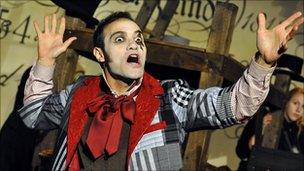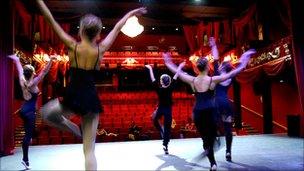Arts funding: Winners and losers speak
- Published
The fates of hundreds of theatres, galleries and other cultural organisations have been decided by the Arts Council England, which has revealed its long-awaited funding plans.
Some bodies have had their subsidies withdrawn or cut, while others have seen their grants increase. Some have been welcomed into the funding fold for the first time.
What is the impact on the organisations involved? The fortunes of three north-east theatre organisations highlight the agony, relief and optimism felt in the arts community.
Losers - Northumberland Theatre Company
Last year, the Arts Council England gave the Northumberland Theatre Company, external £45,000 to buy a new truck to take its touring productions around rural village halls.

The Northumberland Theatre Company believed it ticked all the right boxes for Arts Council approval
Unfortunately, they will not be able to use it for much longer after the Arts Council axed its annual funding, which was £337,000 last year.
"We've got a truck and we've got premises, but we haven't got any money to do the work," says artistic director Gillian Hambleton, who has run the company since 1990.
"I'm absolutely devastated and getting to the point of anger now. We've been an exceptionally strong company doing terrific work out in rural communities."
The company does around 120 performances a year to 10,000 people in places that do not normally have access to professional theatre, she says. It also runs an apprenticeship scheme for budding theatre workers.
"That's going to go as well," she says. "The government has been going on about apprenticeships and giving young people a chance and that's what we've been doing.
"It's the Big Society, giving people opportunities, taking things to places that don't have any access. We're doing all that, we've had wonderful responses from independent Arts Council assessors, and then you still get cut. What else can you do?"
The company is based in the Alnwick Playhouse, external, and put in a joint Arts Council application with the Playhouse for an increased grant to do more work in schools and the community. When they were turned down, the Alnwick Playhouse also lost its £40,000 a year.
Mrs Hambleton says she will appeal if she can. "Obviously we're going to fight and find other ways to create the work," she says. "I'm not going to let the people of these rural communities down."
Winners - The Maltings Theatre and Cinema, Berwick-upon-Tweed
When performers arrive at The Maltings, external, they get cakes baked by the chief executive's wife and a thank-you card signed by the staff.

The 311-seat main house at the Maltings is looking to become a drama powerhouse
It wants to be the friendliest venue in Britain. And in a roundabout way, those home-made cakes have helped it win a 306% rise in its Arts Council funding - one of the biggest increases in the country.
Chief executive Miles Gregory says box office and bar takings have doubled in the past two and a half years - helped by the fact that their warm welcome makes it an appealing place for top artists to visit, even when they would normally play in bigger venues, he says.
"We've had Jason Manford here three times, we're about to present Lee Evans, we've had Julian Clary," Mr Gregory says. "All of the big stand-up names are coming to this tiny venue on the borders.
"We can't offer an urban audience and we can't offer a 1,000-seat theatre, but we can offer an extremely hospitable welcome to artists and audiences."
Mr Gregory says its programme of comedy, theatre, music and film have put it at the heart of local life in a way that few venues have achieved.
"Last week, we sold 1,300 tickets and 12,000 people live in the town. I think it would be quite hard to better that frankly," he says.
"It's one of the poorest towns in the country. It's got one of the lowest average wages in the country. Yet people come to the theatre regularly because we're offering some magic."
Now the Arts Council is recognising and rewarding the venue's success and backing it to achieve bigger and better things in the future.
By 2014, The Maltings will get £184,000 a year from Arts Council England, which will go towards more staff, more original theatre productions, a fellowship programme, a role curating three art galleries in the town and education and outreach work.
Small cut - Theatre Sans Frontieres
Based in Hexham, Northumberland, Theatre Sans Frontieres, external puts on plays in schools and theatres across the country in French, Spanish and German.

Theatre Sans Frontieres has survived - but its touring productions will have fewer venues to visit
"It's really about opening the door for children to be able to think outside the box of where they are and where they live, that there's a world outside Britain that they can have access to," artistic director John Cobb explains.
Its income will drop by 2.2% by 2014 - or 11% if inflation is taken into account - not great, but not nearly as bad as it could have been.
"Obviously we're pleased but there's a feeling that the art landscape is going to change quite a lot," Mr Cobb says. "It's a little bit shocking to hear that colleagues have not received money.
"From a personal point of view, it was a terrible waiting game. It's been a very nervous time."
That decline may mean the company uses fewer actors and puts plans to recruit an extra member of staff on hold, but all current staff are safe, Mr Cobb says.
"It does have an effect - I suppose we're just happy that it's not more than that."
But another concern is for the venues where the company regularly performs, such as Darlington Arts Centre, which has had its Arts Council funding removed and is now under threat.
"Moving around the country, you can't go to an arts centre if it's not there any more," he says. "These things have a knock on effect."